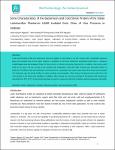




Lactic Acid Bacteria (LAB) and bacteriocins have been applied in many fields in our life. Among LAB, Lactobacillus plantarum plays some essential roles such as starter cultures or probiotics. In this study, bacteriocin synthesized by the strain L. plantarum UL485 isolated from the fermented “Chao” of Hue province in Vietnam was partly characterized. In addition, cold shock protein (Csp) in the strain and the survival of the bacteria with temperature down-shift after freezing were primarily studied. In particular, the effects of pH and temperature on the bacteriocin, containing in the culture supernatant of the strain were evaluated. The bacteriocin was also partly purified via cation exchange chromatography. After cloning, the deduced amino acids of the cold shock protein in the strain were identified. In addition, after freezing, the survival percentage of the bacteria with temperature downshift from 30°C to 8°C at the growing log phase increased in comparison with that of bacteria without temperature downshift
Readership Map
Content Distribution


Lactic Acid Bacteria (LAB) and bacteriocins have been applied in many fields in our life. Among LAB, Lactobacillus plantarum plays some essential roles such as starter cultures or probiotics. In this study, bacteriocin synthesized by the strain L. plantarum UL485 isolated from the fermented “Chao” of Hue province in Vietnam was partly characterized. In addition, cold shock protein (Csp) in the strain and the survival of the bacteria with temperature down-shift after freezing were primarily studied. In particular, the effects of pH and temperature on the bacteriocin, containing in the culture supernatant of the strain were evaluated. The bacteriocin was also partly purified via cation exchange chromatography. After cloning, the deduced amino acids of the cold shock protein in the strain were identified. In addition, after freezing, the survival percentage of the bacteria with temperature downshift from 30°C to 8°C at the growing log phase increased in comparison with that of bacteria without temperature downshift